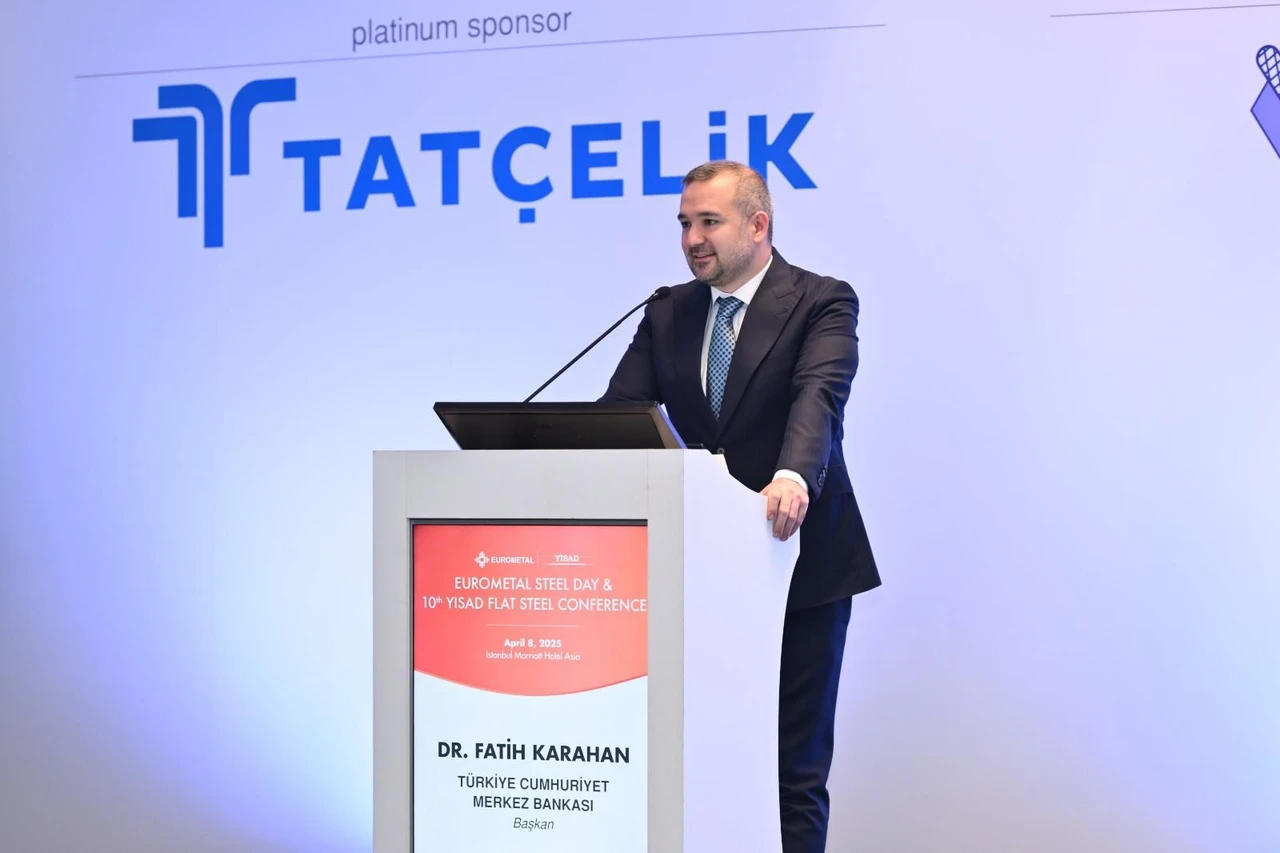Disinflation on track despite global uncertainties, says Turkish central bank governor
 Turkish central bank governor Dr. Fatih Karahan speaks at the EUROMETAL Steel Day and 10th YISAD Flat Steel Conference held in Istanbul, Türkiye, on April 8, 2025. (Photo via X/@SteelOrbis_TR)
Turkish central bank governor Dr. Fatih Karahan speaks at the EUROMETAL Steel Day and 10th YISAD Flat Steel Conference held in Istanbul, Türkiye, on April 8, 2025. (Photo via X/@SteelOrbis_TR)
Turkish central bank (CBRT) governor Fatih Karahan emphasized that Türkiye’s disinflation efforts are progressing successfully, even as the global economy faces heightened uncertainty due to shifting trade dynamics and slowing growth.
Compared to previous years, the composition of domestic demand in 2024 has become more balanced—an important factor in maintaining economic stability and controlling inflation, Karahan stated.
Karahan cited recent economic indicators pointing to a recovery in domestic activity. “While domestic demand remains moderate, it still shows some resilience,” he noted, suggesting that consumer and business spending have not declined sharply despite tighter monetary conditions.
The governor made these comments during a presentation titled “Türkiye’s Macroeconomic Outlook and Monetary Policy” at the EUROMETAL Steel Day and the 10th Flat Steel Export and Industrialists Association (YISAD) Conference, held in Istanbul in collaboration with SteelOrbis on Tuesday.

He also commented on global developments, noting that U.S. President Donald Trump’s reciprocal tariffs had upward effects on growth and inflation expectations. He noted that such policies can create ripple effects in global markets by influencing investor sentiment and capital flows.
Karahan also addressed concerns surrounding a potential global recession, which has led to declines in long-term bond yields—often viewed as a sign of reduced investor confidence in future growth. Additionally, he pointed out that commodity prices have fallen noticeably in recent months, potentially easing inflationary pressures in import-dependent economies like Türkiye.
Discussing Türkiye’s external accounts, Karahan said the country’s current account deficit—a measure of the difference between national savings and investment—is currently at historically low levels. Despite a weakening in global demand, particularly from key export markets, Türkiye has managed to increase its share in global trade.
Emphasizing that when gold and energy imports are excluded, the country’s trade balance has remained relatively stable, indicating underlying strength in non-energy sectors of the economy and reflects efforts to reduce dependence on volatile imports.
‘Inflation expectations trending downward’
“There was a temporary uptick in the underlying trend of inflation during the first quarter. Following goods inflation, the decline in services inflation is also becoming more pronounced,” Karahan said in his assessment.
He explained that price-setting behavior tied to past inflation remains strong in certain components, particularly in services. However, he underscored that cost increases have slowed and that inflation expectations are now on a downward trend.
At the latest Monetary Policy Committee meeting on March 6, the CBRT had reduced the policy rate to 42.5%, extending its current interest rate stance for the third consecutive month.
The next Monetary Policy Meeting, where the CBRT will decide on the policy interest rate, is scheduled for April 17 at 2:00 p.m. local time.



